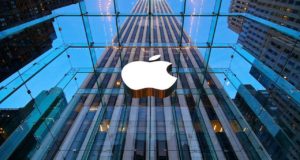Corporates, techs face down Trump on immigration
Global corporate heavyweights, including leading tech companies, are leading the resistance to President Donald Trump’s clampdown on immigration, financing legal opposition, criticising the plan, as well as helping employees caught up in his executive order.
President Trump has ordered a temporary ban on travellers from seven Muslim-majority countries and a 120-day halt to refugee resettlement. The action triggered a global backlash, and sparked confusion and anger after migrants, refugees and visitors were kept off flights and left stranded in airports.
In response to Trump’s move, US coffee house chain Starbucks has promised to hire 10,000 refugees over five years.
 Starbuck’s CEO Howard Schultz said that he had “deep concern” about the president’s order and would be taking “resolute” action, starting with offering jobs to refugees, media reports said.
Starbuck’s CEO Howard Schultz said that he had “deep concern” about the president’s order and would be taking “resolute” action, starting with offering jobs to refugees, media reports said.
“We are developing plans to hire 10,000 of them over five years in the 75 countries around the world where Starbucks does business,” he told employees in a strongly-worded note,” Mr Schultz said.
He said that the move was to make clear that the company “will neither stand by, nor stand silent, as the uncertainty around the new administration’s actions grows with each passing day”.
Apple CEO Tim Cook has sent an email to employees speaking out against the immigration executive order that United States President Donald Trump signed yesterday afternoon.
“Apple would not exist without immigration, let alone thrive and innovate the way we do,” the email said.
Google sent out a memo to its employees urging anyone with a visa or green card from one of the banned countries – Iran, Iraq, Libya, Somalia, Sudan, Syria and Yemen – to cancel any travel plans.
On Sunday, the Google co-founder and Alphabet president, Sergey Brin, was photographed among people protesting at San Francisco airport over the immigration measures.
Satya Nadella, CEO of Microsoft and an Indian immigrant, told employees the company was committed to providing “legal advice and assistance” to its 76 employees who are citizens of the affected countries.
“We believe in the importance of protecting legitimate and law-abiding refugees whose very lives may be at stake in immigration proceedings. So whether it’s in this country, or the European Union, or in China or South America, we engage,” Mr Nadella said.
Facebook boss Mark Zuckerberg said: “We should also keep our doors open to refugees and those who need help. Stayed tuned for more, contact me if urgent need for housing.”
“My great grandparents came from Germany, Austria and Poland. Priscilla’s parents were refugees from China and Vietnam. The United States is a nation of immigrants, and we should be proud of that,” he said.
“Like many of you, I’m concerned about the impact of the recent executive orders signed by President Trump.
“We need to keep this country safe, but we should do that by focusing on people who actually pose a threat,” Mr Zuckerberg said.
US tech firms of all sizes recruit among immigrants and have foreign nationals working and traveling between the US and other countries, including the banned countries.
A recent report found that about 45 percent of high-tech companies in the Fortune 500 were founded by immigrants or children of immigrants.
GE CEO Jeff Immelt said his company had “many employees from named countries who are “critical to our success and they are our friends and partners”.
He said GE would “continue to make its voice heard with the new administration”.
Tesla’s Elon Musk, who has in the past praised Trump for his cabinet picks, tweeted that “many people who are affected by this are strong supporters of the US who don’t deserve to be rejected”.
Uber head Travis Kalanick said on Twitter that he would take industry concerns about immigration to Trump’s business advisory council, where the company serves.
Mr Kalanick has faced opposition on social media for agreeing to be part of the advisory group but a recent Facebook post called the immigration ban “wrong and unjust” and said that Uber would create a $US3 million fund to help drivers with immigration issues.
Laurie Nowell
AMES Australia Senior Journalist












